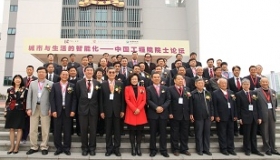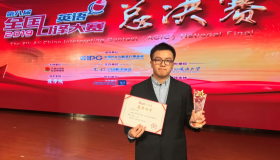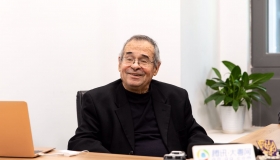Nobel Laureate Jean Tirole's Speech at The First Graduation Ceremony for Bachelor Degree Graduates
Nobel Laureate Jean Tirole's speech on the First Graduation Ceremony.

Dear graduates, class of 2014,
A little less than four years ago, the Royal Swedish academy of sciences called me with some rather outstanding news. I didn’t answer at first, being in a meeting and not expecting a call. After ten minutes of ringing, the colleague I was with suggested I picked up the ever-buzzing phone, and the rest - as they say - is history. That day marked a culminating point in my career and while I didn’t really know what was happening to me then, and I’m still not sure. I do, it was the start of an incredible adventure that has changed many things in my life.
I believe today marks a similar change for all of you. You might not think about it right away, but in a few years’ time, you will look back to your years spent here - hopefully with fond memories of both the classrooms and the student life - and realize how your lives have changed since then, realize how far you’ve come. This important day marks the end of four years of studies, discoveries, doubts, and of course hard work.
You might think that Nobel laureates are extraordinary people, some kind of supermen or superwomen- at least that is what I thought, until I was admitted into the club, to paraphrase Groucho Marx.
At least I was not. When I received the Prize, my mother, a teacher, was asked on radio whether her son was a genius, she correctly answered: “definitely not”. Indeed if you had asked me that one day I would win the prize I would have thought you were insane.
But each Nobel laureate, like more generally professionally successful people, has a story and has qualities; he or she is:
‣ Is hard working
‣ Is obstinate. In 2014 the chemistry prize was awarded to a Rumanian, Steffan Hell, who had received his PhD from Heidelberg University. The content of his thesis in effect was the seeds for his Nobel Prize. He did not get a job, was unemployed, later moved to the University of Turku in Finland, and fought until the originality of his ideas was recognized.
‣ Is totally passionate about his/her field while at the same time being critical of it.
‣ Has the right attitude, knows how to engage in wishful thinking- believe that data will deliver, that the tentative theorem will prove correct- while being deeply aware of the need to carefully check one's analysis.
‣ Benefits from occasional serendipity and has further managed to be in the right place at the right time. One cannot overstress the role that others play in one's own intelligence.
You have the talent and the tools, don't stop until you know you’re at your very best and, even then, don't rest on your laurels. You all can do amazing things.
So the first thing to take home is to believe in yourself. Then, your passion and your environment will take you a long way.
The second recommendation is to experience this day with deep gratitude to everyone who has supported you on your journey here.
‣ your professors and administrative staff, who demonstrate passion in their work and a generosity of spirit in their relationships with their students,
‣ your families and friends who have supported you all these years.
My third and last take-home point concerns your responsibility.
My third and last take-home point concerns your responsibility.
Your new degree comes with many opportunities, but also a few duties. As trained economists and business people and as Chinese University of Hong Kong graduates, you will have to relentlessly represent the excellence of your institution and the rigor of our common passion, economics.
You graduate today in an era of worldwide challenges that are more than ever in need of economics – how can we manage the impressive digital revolution to benefit society and protect consumers, workers and citizens? How can we control climate change to protect and respect our planet? How can we ensure that increasingly complex financial systems stay healthy and efficient? How can we ensure that generosity and reason will prevail against populism and nationalism?
You will have to combat the cognitive biases emphasized throughout my book Economics for the common good, e.g. our reliance on first impressions, our dependence on heuristics and narratives, our eagerness to believe what we want to believe, see what we want to see. Cognitive biases that are so skilfully exploited by those who want to propagate inward-looking attitudes, hate speech, and reactionary ideas. The world of science by contrast has no frontiers, no boundaries. What a better symbol than this hotbed of knowledge, your university.
You are the generation that will tackle our many daunting but exciting challenges. You will behave in a socially responsible way. And, at a time when science is regularly attacked and knowledge disregarded, when economics is often misunderstood and reduced to simple ideas, you will have to stand your ground and relentlessly explain why science and knowledge are so important for the world and its future. You will have to show what economics is capable of, and employ it to make this world a better place. By so doing, you will promote the common good.
Many thanks to all of you. I wish you all the best for the future!
You are the generation that will tackle our many daunting but exciting challenges. You will behave in a socially responsible way. And, at a time when science is regularly attacked and knowledge disregarded, when economics is often misunderstood and reduced to simple ideas, you will have to stand your ground and relentlessly explain why science and knowledge are so important for the world and its future. You will have to show what economics is capable of, and employ it to make this world a better place. By so doing, you will promote the common good.
Many thanks to all of you. I wish you all the best for the future!
More




